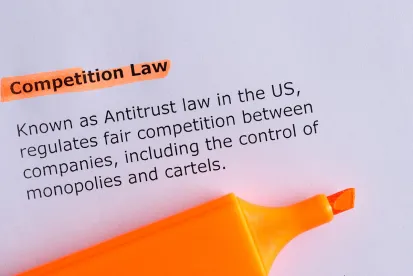Several states over the past few years have passed legislation prohibiting the use in noncompete agreements (and other employment-related agreements) of out-of-state choice-of-law and forum selection provisions. A few of these states’ laws include enforcement mechanisms with stringent penalties, such as California, which provides for injunctive relief and attorneys’ fees to an aggrieved employee; Washington, which entitles aggrieved employees to actual damages or statutory penalties of $5,000, as well as their attorneys’ fees; and, beginning in August, Colorado, where any violation of that state’s noncompete statute (including the prohibition on out-of-state choice-of-law and forum selection provisions) could lead to civil and criminal penalties.
Other states, however, such as Massachusetts and Illinois, have no such enforcement mechanisms for violations of their statutory prohibitions of out-of-state choice-of-law and forum selection provisions. Thus, while an employee may prevail within those states on an argument that an out-of-state choice-of-law or forum selection provision is void, they would not be entitled to any damages or attorneys’ fees. Employees in these states must, therefore, rely on a court in another state to cede its own state’s sovereignty to the legislature of the employee’s home state. There may be little incentive for courts to do so under principles of federalism and state sovereignty. Why should a Virginia court let the Massachusetts legislature dictate what it does, especially when the parties have contracted otherwise?
This was borne out in a recent decision of the U.S. District Court for the Eastern District of Virginia, in which the Court addressed the requirement in the Massachusetts Noncompetition Agreement Act (“MNCA”) that any civil actions relating to employee noncompete agreements must be filed in Massachusetts state court. In The Hilb Group of New England, LLC v. Susan LePage, the defendant, LePage, signed a Confidentiality and Non-Solicitation Agreement (the “Agreement”) in 2019 that included a forum selection clause granting exclusive jurisdiction of any disputes arising thereunder to “the courts of the Commonwealth of Virginia located in the City of Richmond and of the United States District Court for the Eastern District of Virginia, Richmond Division.” LePage resigned in 2021 and joined a competitor. Plaintiff filed suit for breach of the Agreement in Virginia, and LePage moved to dismiss the complaint for improper venue.
Among other things, LePage argued that “enforcing the forum selection clause will go against Massachusetts’s strong public policy interest as manifested in the [MNCA].” The Court rejected that argument, holding:
First, federal law preempts Massachusetts’s procedural rules. Second, as the Supreme Court explained in [M/S Bremen v. Zapata Off-Shore Co., 407 U.S. 1 (1972)], any disfavor Massachusetts harbors towards forum selection clauses—as manifested in the MNCA—does not weaken the presumption of enforceability that forum selection clauses enjoy in federal court. Indeed, to allow the MNCA to trump the parties’ contractual choice of forum would allow provincial attitudes to dominate. Finally, no Massachusetts court has held that the MNCA manifests the state’s strong public policy. Thus, the enforcement of the Agreement’s forum selection clause would not go against a strong public policy of Massachusetts.
This is an interesting decision because the MNCA does not even seem to apply to LePage’s Agreement – indeed, the Court pointed out in a footnote that the parties disputed whether it applied – because the Agreement did not include a noncompete provision, and the MNCA does not apply to other forms of post-employment restrictive covenants such as non-solicitation covenants. The Court dealt with this in a footnote, opining that “it need not decide whether the MNCA applies to the Agreement” because “the Court finds the Agreement’s forum selection clause enforceable despite the MNCA.” (Emphasis added). In other words, the MNCA is irrelevant to this analysis –which, in and of itself, says something about the MNCA’s requirement that claims relating to noncompetes must be filed in Massachusetts state court.
Under this reasoning, even where the MNCA applies to an agreement, an out-of-state forum selection clause would still be enforceable against a Massachusetts employee in federal court outside of Massachusetts based on preemption and principles of federalism and state sovereignty. It is unclear whether a court would rule differently if a court in Massachusetts were to hold that “the MNCA manifests the state’s strong public policy” because issues of preemption and what the Court termed “provincial attitudes” would remain, but the Court in LePage did mention the lack of such a holding as a relevant factor.
Regardless, were LePage to have lived and worked in California or Washington (or, beginning August 9, 2022, in Colorado), she would have had the option of filing an action in those states seeking to invalidate the forum selection clause and, if she succeeded, she would have been entitled to injunctive relief, damages, and/or attorneys’ fees. But because the MNCA does not have a similar enforcement mechanism providing for such remedies, that option was not viable (or, at the very least, economical) in Massachusetts. She could have filed a declaratory judgment action asking a Massachusetts court to declare the Virginia forum selection clause void, but the action likely would have been analyzed under traditional first-filed jurisprudence. Whether she succeeded or not, LePage would not have been entitled to injunctive relief, damages, and/or attorneys’ fees, making it an expensive endeavor and any victory pyrrhic.
In sum, some out-of-state choice-of-law and forum selection clauses remain enforceable, even against employees who live or work in some states that purport to prohibit them. Employers should beware, however, of those states in which there are civil and criminal penalties for violations of their respective noncompete laws (including prohibitions on out-of-state choice-of-law and forum selection provisions).




 />i
/>i
